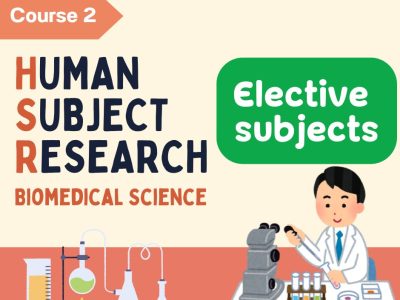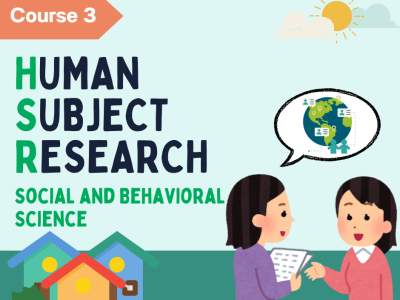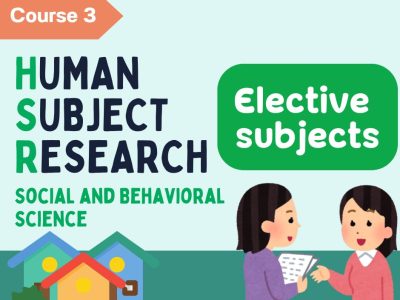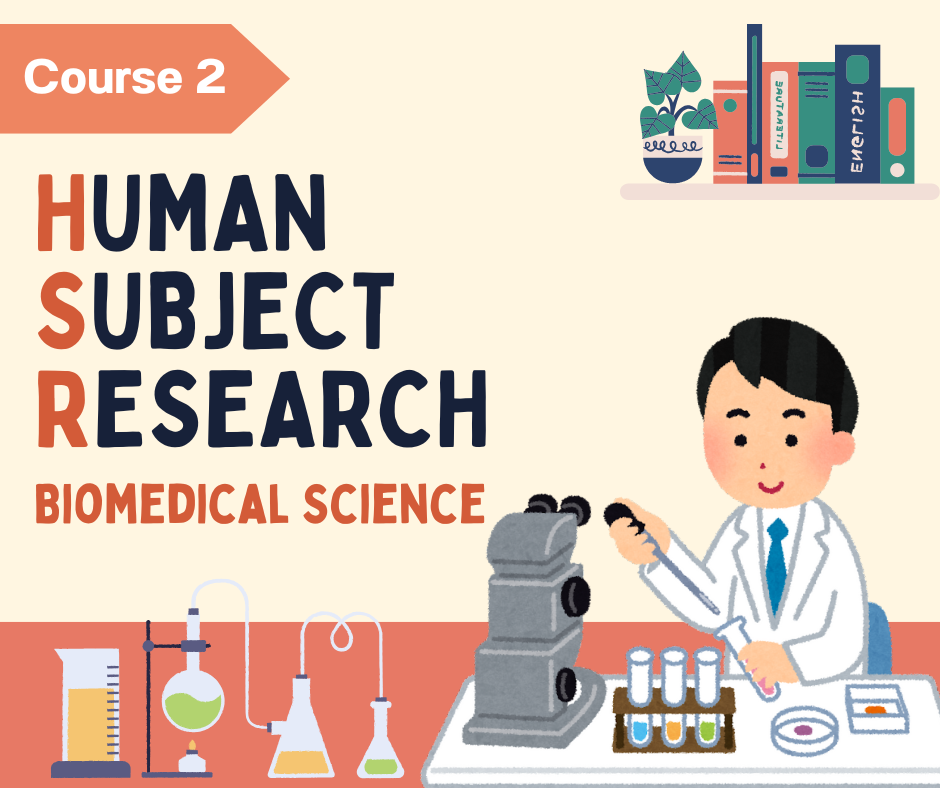2. Human Subject Research in Biomedical Science (Core subjects)
หลักสูตรนี้เป็นหลักสูตรพื้นฐานสำหรับผู้ที่ต้องการศึกษาวิจัยในมนุษย์ในสาขาวิทยาศาสตร์ชีวการแพทย์ โดยมุ่งเน้นการคุ้มครองสิทธิและสวัสดิภาพของผู้เข้าร่วมการวิจัย เพื่อให้มั่นใจว่าการศึกษาดำเนินไปอย่างรับผิดชอบและเป็นไปตามหลักจริยธรรม หัวข้อสำคัญ ได้แก่ หลักจริยธรรมพื้นฐาน เช่น Nuremberg Code, Declaration of Helsinki และ Belmont Report การออกแบบและดำเนินการวิจัยทางชีวการแพทย์ (Research Methodology in Biomedical Science) การวิจัยในกลุ่มเปราะบาง (Research in Vulnerable Populations) แนวปฏิบัติในการวิจัยภาคสนามและห้องปฏิบัติการ (Field-based and Laboratory Research) การคัดเลือกและรับสมัครอาสาสมัครวิจัย (Recruitment Process) การประเมินความเสี่ยงและผลประโยชน์ของงานวิจัย (Risk and Benefit Assessment) การขอความยินยอมจากอาสาสมัคร …
Overview
หลักสูตรนี้เป็นหลักสูตรพื้นฐานสำหรับผู้ที่ต้องการศึกษาวิจัยในมนุษย์ในสาขาวิทยาศาสตร์ชีวการแพทย์ โดยมุ่งเน้นการคุ้มครองสิทธิและสวัสดิภาพของผู้เข้าร่วมการวิจัย เพื่อให้มั่นใจว่าการศึกษาดำเนินไปอย่างรับผิดชอบและเป็นไปตามหลักจริยธรรม
หัวข้อสำคัญ ได้แก่
- หลักจริยธรรมพื้นฐาน เช่น Nuremberg Code, Declaration of Helsinki และ Belmont Report
- การออกแบบและดำเนินการวิจัยทางชีวการแพทย์ (Research Methodology in Biomedical Science)
- การวิจัยในกลุ่มเปราะบาง (Research in Vulnerable Populations)
- แนวปฏิบัติในการวิจัยภาคสนามและห้องปฏิบัติการ (Field-based and Laboratory Research)
- การคัดเลือกและรับสมัครอาสาสมัครวิจัย (Recruitment Process)
- การประเมินความเสี่ยงและผลประโยชน์ของงานวิจัย (Risk and Benefit Assessment)
- การขอความยินยอมจากอาสาสมัคร และการปกป้องข้อมูลส่วนบุคคล (Informed Consent and Data Protection)
หลักสูตรนี้มีวิชาบังคับเรียนจำนวน 21 วิชา และมีวิชาเลือก (เลือกหัวข้อที่สนใจ) อีกจำนวน 2 วิชา
Curriculum
- 7 Sections
- 21 Topics
- 16 Weeks
- Section 1: Human Research Ethics Overview8
- 1.1Research Involving Human Subjects
- 1.2Quiz: Research Involving Human Subjects2 Questions
- 1.3History and Ethics of Human Subjects Research
- 1.4Quiz: History and Ethics of Human Subjects Research2 Questions
- 1.5Institutional Review Board (IRB) Composition, responsibility and review process
- 1.6Quiz: Institutional Review Board (IRB) Composition, responsibility and review process2 Questions
- 1.7Types of protocol review
- 1.8Quiz: Types of protocol review2 Questions
- Section 2: Recruitment and Informed Consent Processes4
- 2.1Recruitment process, Informed consent process, Reconsent process, Informed opt-out
- 2.2Quiz: Recruitment process, Informed consent process, Reconsent process, Informed opt-out2 Questions
- 2.3Modifications and waivers of informed consent
- 2.4Quiz: Modifications and waivers of informed consent2 Questions
- Section 3: Research Involving Vulnerable Groups4
- Section 4: Risk and Benefit Assessment4
- Section 5: Research Integrity and Management2
- Section 6: Scientific and ethical considerations in different types of research12
- 6.1Biomedical science: Records-based research
- 6.2Quiz: Biomedical science: Records-based research2 Questions
- 6.3Biomedical science: Hospital-based research
- 6.4Quiz: Biomedical science: Hospital-based research2 Questions
- 6.5Community-based research
- 6.6Quiz: Community-based research2 Questions
- 6.7Laboratory-based research
- 6.8Quiz: Laboratory-based research2 Questions
- 6.9Human genetics
- 6.10Quiz: Human genetics2 Questions
- 6.11Biobank
- 6.12Quiz: Biobank2 Questions
- Section 7: Privacy and Confidentiality8
- 7.1Privacy and confidentiality
- 7.2Quiz: Privacy and confidentiality2 Questions
- 7.3PDPA related to medical research
- 7.4Quiz: PDPA related to medical research2 Questions
- 7.5Laws and regulations related to research
- 7.6Quiz: Laws and regulations related to research2 Questions
- 7.7Data sharing and material transfer agreement
- 7.8Quiz: Data sharing and material transfer agreement2 Questions






